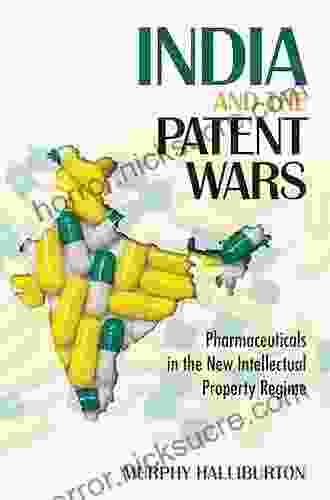Pharmaceuticals In The New Intellectual Property Regime: The Culture And...

4.5 out of 5
| Language | : | English |
| File size | : | 1814 KB |
| Text-to-Speech | : | Enabled |
| Screen Reader | : | Supported |
| Enhanced typesetting | : | Enabled |
| Word Wise | : | Enabled |
| Print length | : | 202 pages |
The development and distribution of pharmaceuticals is a complex process that involves a wide range of stakeholders, including researchers, manufacturers, distributors, healthcare providers, and patients. The intellectual property (IP) regime plays a critical role in shaping this process, as it determines the incentives and rewards for innovation and the availability and affordability of medicines.
In recent years, the IP regime has undergone significant changes, both at the international and national levels. These changes have been driven by a number of factors, including the rise of new technologies, the globalization of the pharmaceutical industry, and the increasing importance of public health concerns.
One of the most significant changes to the IP regime has been the adoption of the Agreement on Trade-Related Aspects of Intellectual Property Rights (TRIPS) by the World Trade Organization (WTO) in 1995. TRIPS sets minimum standards for the protection of intellectual property, including patents, trademarks, and copyrights. It has had a major impact on the pharmaceutical industry, as it has led to the strengthening of patent protection in many countries.
Another important change to the IP regime has been the development of new technologies, such as biotechnology and genomics. These technologies have led to the development of new and more effective medicines, but they have also raised new challenges for the IP system. For example, it can be difficult to determine who owns the intellectual property rights to a new medicine that is based on a combination of existing technologies.
The globalization of the pharmaceutical industry has also had a significant impact on the IP regime. The increasing interconnectedness of the global economy has made it easier for companies to move their operations to countries with more favorable IP laws. This has put pressure on governments to strengthen their IP laws in order to attract investment from the pharmaceutical industry.
Finally, the increasing importance of public health concerns has also led to changes to the IP regime. In recent years, there has been growing concern about the high cost of medicines and the lack of access to essential medicines in developing countries. This has led to calls for reforms to the IP regime that would make medicines more affordable and accessible.
The changes to the IP regime have had a significant impact on the pharmaceutical industry. They have led to increased investment in research and development, the development of new and more effective medicines, and the globalization of the pharmaceutical industry. However, they have also raised new challenges for the IP system, such as the difficulty of determining who owns the intellectual property rights to new medicines and the high cost of medicines.
The future of the IP regime is uncertain. However, it is clear that the changes that have taken place in recent years will continue to have a major impact on the pharmaceutical industry. It is important to continue to monitor these changes and to ensure that the IP regime is working in the best interests of society as a whole.
The Culture Of Pharmaceuticals
The pharmaceutical industry is a unique and complex industry. It is characterized by a high degree of innovation and a long history of government regulation. The industry is also heavily influenced by the culture of медицине, which emphasizes the importance of safety and efficacy.
The culture of pharmaceuticals has a significant impact on the way that new medicines are developed and marketed. For example, the emphasis on safety and efficacy means that pharmaceutical companies must conduct extensive clinical trials before a new medicine can be approved for sale. This process can be time-consuming and expensive, but it is essential for ensuring that new medicines are safe and effective.
The culture of pharmaceuticals also influences the way that new medicines are priced. Pharmaceutical companies must consider the cost of research and development, as well as the need to make a profit, when setting prices for their products. This can lead to high prices for new medicines, which can make it difficult for patients to afford them.
The culture of pharmaceuticals is also influenced by the relationship between doctors and patients. Doctors are often seen as the gatekeepers to new medicines, and they play a critical role in deciding which medicines are prescribed to patients. This relationship can be influenced by a number of factors, including the doctor's own beliefs about the efficacy of a particular medicine and the patient's ability to pay for it.
The culture of pharmaceuticals is a complex and ever-changing phenomenon. It is important to understand the culture of pharmaceuticals in order to make informed decisions about the development, marketing, and pricing of new medicines.
The Law Of Pharmaceuticals
The law of pharmaceuticals is a complex and ever-changing field. It is governed by a wide range of laws and regulations, both at the national and international levels. The law of pharmaceuticals is essential for protecting the public health and safety, while also encouraging innovation and investment in the pharmaceutical industry.
One of the most important laws governing the pharmaceutical industry is the Food, Drug, and Cosmetic Act (FDCA). The FDCA is the primary law that governs the safety and efficacy of drugs in the United States. It requires pharmaceutical companies to conduct extensive clinical trials before a new drug can be approved for sale. The FDCA also gives the Food and Drug Administration (FDA) the authority to regulate the marketing and distribution of drugs.
In addition to the FDCA, there are a number of other laws that govern the pharmaceutical industry. These laws include the Patent Act, the Trademark Act, and the Copyright Act. These laws protect the intellectual property rights of pharmaceutical companies, which is essential for encouraging innovation and investment in the pharmaceutical industry.
The law of pharmaceuticals is constantly evolving to keep pace with the changing needs of the pharmaceutical industry. In recent years, there has been a growing emphasis on international cooperation in the regulation of pharmaceuticals. This cooperation is essential for ensuring that new medicines are safe and effective, and that they are available to patients around the world.
The Economics Of Pharmaceuticals
The pharmaceutical industry is a major driver of the global economy. It is estimated that the global pharmaceutical market will be worth over $1.5 trillion by 2023. The industry is characterized by a high degree of research and development (R&D) spending, and a long history of government regulation. The economics of pharmaceuticals are complex and ever-changing, but they are essential for understanding the industry and its impact on the global economy.
One of the most important economic factors in the pharmaceutical industry is the cost of R&D. Pharmaceutical companies spend billions of dollars each year on R&D, in order to develop new and more effective medicines. The cost of R&D is a major factor in the price of new medicines, and it can take many years before a new medicine is approved for sale.
Another important economic factor in the pharmaceutical industry is the pricing of medicines. Pharmaceutical companies set the prices of their medicines based on a number of factors, including the cost of R&D, the cost of manufacturing, and the need to make a profit. The pricing of medicines can be a controversial issue, as it can affect the affordability of medicines for patients.
4.5 out of 5
| Language | : | English |
| File size | : | 1814 KB |
| Text-to-Speech | : | Enabled |
| Screen Reader | : | Supported |
| Enhanced typesetting | : | Enabled |
| Word Wise | : | Enabled |
| Print length | : | 202 pages |
Do you want to contribute by writing guest posts on this blog?
Please contact us and send us a resume of previous articles that you have written.
 Fiction
Fiction Non Fiction
Non Fiction Romance
Romance Mystery
Mystery Thriller
Thriller SciFi
SciFi Fantasy
Fantasy Horror
Horror Biography
Biography Selfhelp
Selfhelp Business
Business History
History Classics
Classics Poetry
Poetry Childrens
Childrens Young Adult
Young Adult Educational
Educational Cooking
Cooking Travel
Travel Lifestyle
Lifestyle Spirituality
Spirituality Health
Health Fitness
Fitness Technology
Technology Science
Science Arts
Arts Crafts
Crafts DIY
DIY Gardening
Gardening Petcare
Petcare Deanna Raybourn
Deanna Raybourn Ellen Meloy
Ellen Meloy Heroes Of The Art
Heroes Of The Art William Cane
William Cane Kent Allen
Kent Allen David Robson
David Robson Suzanne Bender
Suzanne Bender Joe Baker
Joe Baker Marian L Tupy
Marian L Tupy Ilya Grigorik
Ilya Grigorik Paul Bellow
Paul Bellow Budd Coates
Budd Coates Gary Oberg
Gary Oberg Vivienne Edgecombe
Vivienne Edgecombe Lsatmax Lsat Prep
Lsatmax Lsat Prep Don L Gates
Don L Gates Jeremy Lent
Jeremy Lent Fr Mike Driscoll
Fr Mike Driscoll Octavia Steen
Octavia Steen Troy Horne
Troy Horne Jessica Misener
Jessica Misener Tony Frezza
Tony Frezza Bethany Warren
Bethany Warren Department Of The Army
Department Of The Army Chris Cage
Chris Cage Ellen Schreiber
Ellen Schreiber Charlotte Mason
Charlotte Mason Henri De Lestapis
Henri De Lestapis Stephen Jenkinson
Stephen Jenkinson Nate Summers
Nate Summers Howard Burton
Howard Burton Lizzie Lane
Lizzie Lane Bill Hanstock
Bill Hanstock Michael P Nordvall
Michael P Nordvall Gerad Kite
Gerad Kite Percy Keese Fitzhugh
Percy Keese Fitzhugh Martin Lee Abbott
Martin Lee Abbott Bb Easton
Bb Easton Terrence Talley
Terrence Talley Jenson Button
Jenson Button Kiera Cass
Kiera Cass Gooseberry Patch
Gooseberry Patch Eric Provan
Eric Provan Kelli L Ferguson
Kelli L Ferguson Sanjay Gupta
Sanjay Gupta Ben O Williams
Ben O Williams Stacey Barrett
Stacey Barrett Denise Gaskins
Denise Gaskins Dean R Giles
Dean R Giles Peter Rendell
Peter Rendell John Fry
John Fry Beth Reekles
Beth Reekles Theodore Gray
Theodore Gray Helen Leigh
Helen Leigh Izaak Walton
Izaak Walton John C Lundell
John C Lundell John Taylor
John Taylor Patricia Leavy
Patricia Leavy Jonathan Knight
Jonathan Knight Rainbow Rowell
Rainbow Rowell Kevin Johnson
Kevin Johnson Roxanne Reid
Roxanne Reid Lawrence J Cohen Phd
Lawrence J Cohen Phd Catherine Faherty
Catherine Faherty Oliver Sacks
Oliver Sacks Eliza Hof
Eliza Hof Tamarack Song
Tamarack Song Glenn Randall
Glenn Randall Adam Stevens
Adam Stevens Ellen Galinsky
Ellen Galinsky Farley Mowat
Farley Mowat Wesley C Salmon
Wesley C Salmon Phil Stamper
Phil Stamper Jeff Ramey
Jeff Ramey Makiia Lucier
Makiia Lucier James Allen
James Allen Julie L Hall
Julie L Hall John E Eck
John E Eck Kyle Simpson
Kyle Simpson Stanley Cohen
Stanley Cohen Eileen Kennedy Moore
Eileen Kennedy Moore Drew Estell
Drew Estell John R Bruning
John R Bruning Joy Hendry
Joy Hendry Julie Urbanski
Julie Urbanski Debbie Marks
Debbie Marks Nathan Doneen
Nathan Doneen Jaimal Yogis
Jaimal Yogis Khoi Tu
Khoi Tu Ben Worthington
Ben Worthington David Rynecki
David Rynecki Carol Walters
Carol Walters Emily Glickman
Emily Glickman Lucy Cooke
Lucy Cooke Barry King
Barry King Rohan Agarwal
Rohan Agarwal Rich Roll
Rich Roll Troy Treasure
Troy Treasure Leila Kalmbach
Leila Kalmbach Jack Buck
Jack Buck Shelby Evans
Shelby Evans Brian Reddington
Brian Reddington Linda Spatig
Linda Spatig Blandine Calais Germain
Blandine Calais Germain Tracy Tresidder
Tracy Tresidder Sharon Bergen
Sharon Bergen Richard G Lomax
Richard G Lomax Jacqueline Marcell
Jacqueline Marcell Lori Ashley Taylor
Lori Ashley Taylor Lisa Mckay
Lisa Mckay Rough Guides
Rough Guides Lene Fogelberg
Lene Fogelberg Stuart James Amei
Stuart James Amei Melissa De La Cruz
Melissa De La Cruz Hannah Witton
Hannah Witton David Diaz
David Diaz James Blake
James Blake Shelley C Safian
Shelley C Safian Mike Brown
Mike Brown Dan Orr
Dan Orr Carol Devine
Carol Devine Justin Roethlingshoefer
Justin Roethlingshoefer Huntley Fitzpatrick
Huntley Fitzpatrick Michael S Kelly
Michael S Kelly Richard Dawkins
Richard Dawkins Sarah Spencer
Sarah Spencer Natasha D Lane
Natasha D Lane Stephan A Hoeller
Stephan A Hoeller Edward Beauclerk Maurice
Edward Beauclerk Maurice Seth A Roberts
Seth A Roberts Mindy Cockeram
Mindy Cockeram Peggy J Martin
Peggy J Martin Rosamund Hodge
Rosamund Hodge Benjamin Johnston
Benjamin Johnston William C Oakes
William C Oakes Bertrand Russell
Bertrand Russell John Huggan
John Huggan Robert Page
Robert Page Mikki Morrissette
Mikki Morrissette Monica Swanson
Monica Swanson Sandra Brown
Sandra Brown Christy Teglo
Christy Teglo Ben Smith
Ben Smith William J Callaway
William J Callaway George Daniel
George Daniel S Connolly
S Connolly Joseph Ciarrochi
Joseph Ciarrochi Sarah Elizabeth Richards
Sarah Elizabeth Richards Kris Wilder
Kris Wilder Ben Gillman
Ben Gillman Tim Tebow
Tim Tebow Dan R Lynch
Dan R Lynch Rick Wiebe
Rick Wiebe Bernardo Kastrup
Bernardo Kastrup Ethan Sawyer
Ethan Sawyer Patti Jean
Patti Jean Stephanie Baier
Stephanie Baier Phil Martin
Phil Martin Thomas Norman Dewolf
Thomas Norman Dewolf Tom Dodd
Tom Dodd Cathy Jackson
Cathy Jackson Molly Mills
Molly Mills Christy Mihaly
Christy Mihaly Eliza Larson
Eliza Larson Si Sheppard
Si Sheppard Sheila Lukins
Sheila Lukins Bernard Lewis
Bernard Lewis Sona Charaipotra
Sona Charaipotra Kurt Jacobs
Kurt Jacobs Lelah Sullivan
Lelah Sullivan Virginia Smith Harvey
Virginia Smith Harvey Patricia Hachten Wee
Patricia Hachten Wee Nicola Griffith
Nicola Griffith Jonathan Wolf
Jonathan Wolf Ahlia Rose
Ahlia Rose Greg Schwipps
Greg Schwipps Rachel Ann Cullen
Rachel Ann Cullen Michael Pollan
Michael Pollan Mary V Solanto
Mary V Solanto Dudley Wright
Dudley Wright John J Watkins
John J Watkins Print Replica Kindle Edition
Print Replica Kindle Edition Nancy Mohrbacher
Nancy Mohrbacher Leonard Mlodinow
Leonard Mlodinow Catherine B Walker
Catherine B Walker Jill H Rathus
Jill H Rathus Joe Clement
Joe Clement Deborah Taylor Hough
Deborah Taylor Hough Stan Byrdy
Stan Byrdy Joe Farinaccio
Joe Farinaccio Dan Inosanto
Dan Inosanto Chris Batha
Chris Batha Blythe Lucero
Blythe Lucero Jeff Grubb
Jeff Grubb Bruce Kirkby
Bruce Kirkby Kevin Easley
Kevin Easley Lesley Pyne
Lesley Pyne Nicola Morgan
Nicola Morgan Naomi Steiner
Naomi Steiner Hillary Sadler
Hillary Sadler Jay Kirk
Jay Kirk Ricki Linksman
Ricki Linksman T L Christianson
T L Christianson Ciara Attwell
Ciara Attwell Colin Gordon
Colin Gordon Clifford Geertz
Clifford Geertz David Barrie
David Barrie Benjamin Southerland
Benjamin Southerland David Jeremiah
David Jeremiah Maria Kriya
Maria Kriya Theresa Bane
Theresa Bane Tomoko Fuse
Tomoko Fuse Ashley Lecker
Ashley Lecker Rosalie Knecht
Rosalie Knecht Jo Boaler
Jo Boaler Albert S Tarendash
Albert S Tarendash Peter L Berger
Peter L Berger David Bain
David Bain David Lawson Phd
David Lawson Phd Maggie Kline
Maggie Kline Timothy Gowers
Timothy Gowers Lebawit Lily Girma
Lebawit Lily Girma Esther Hicks
Esther Hicks Rachael Denhollander
Rachael Denhollander Deborah D Gray
Deborah D Gray Nancy Redd
Nancy Redd Chuck Lukacs
Chuck Lukacs Frank Ayres
Frank Ayres Bella Bathurst
Bella Bathurst Scott Imhoff Phd
Scott Imhoff Phd C C Hunter
C C Hunter Scott Wilson
Scott Wilson Ben Hoppe
Ben Hoppe Stefanie Molin
Stefanie Molin Sherry Turkle
Sherry Turkle Tim Ingold
Tim Ingold Les Carter
Les Carter Sally Moran
Sally Moran Peter Greyson
Peter Greyson Holly Black
Holly Black Behan Gifford
Behan Gifford John Henderson
John Henderson Malin Gutestam
Malin Gutestam Oleg Senkov
Oleg Senkov Stephen Smith
Stephen Smith Jean Louis Vidal
Jean Louis Vidal Meghan Casey
Meghan Casey Kenneth R Miller
Kenneth R Miller Educational Testing Service
Educational Testing Service Lawrence S Leff
Lawrence S Leff Charlotte Mary Yonge
Charlotte Mary Yonge Jordan Rivet
Jordan Rivet Patricia B Mcconnell
Patricia B Mcconnell Maggie Dent
Maggie Dent Carla Killough Mcclafferty
Carla Killough Mcclafferty Mike Settele
Mike Settele Emma Mckinney
Emma Mckinney Kate Williams
Kate Williams Chris Mcintyre
Chris Mcintyre T L Branson
T L Branson Frank Galli
Frank Galli Leia Stone
Leia Stone Vasile Berinde
Vasile Berinde Scott A Hatch
Scott A Hatch W David Pierce
W David Pierce Emma Walker
Emma Walker Nicholas Griffin
Nicholas Griffin John Mandel
John Mandel Peter Brown Hoffmeister
Peter Brown Hoffmeister Dave Rearwin
Dave Rearwin Brett Cyrgalis
Brett Cyrgalis Will Oxley
Will Oxley John Branch
John Branch Beth Baker
Beth Baker Christian Smith
Christian Smith Josh Gates
Josh Gates Bill W
Bill W Christy Dorrity
Christy Dorrity Gwen Bettwy
Gwen Bettwy Jamie C Martin
Jamie C Martin Laurence S Moy
Laurence S Moy Christine Desdemaines Hugon
Christine Desdemaines Hugon Brian Sparks
Brian Sparks Editors Of Martha Stewart Living
Editors Of Martha Stewart Living Kalliope Barlis
Kalliope Barlis Lucy Ruddle
Lucy Ruddle Slavka Bodic
Slavka Bodic Janice K Ledford
Janice K Ledford Laura Hoggins
Laura Hoggins Bill Jamison
Bill Jamison Rose Kearney Nunnery
Rose Kearney Nunnery Phil Jarratt
Phil Jarratt Roger Eckstine
Roger Eckstine Melissa Ford
Melissa Ford Sandy Glenn
Sandy Glenn Prem Carnot
Prem Carnot Eva Hoffman
Eva Hoffman Catherine White
Catherine White Bernadette Noll
Bernadette Noll Steve Schwartz
Steve Schwartz Rick Rinehart
Rick Rinehart Fran Zimniuch
Fran Zimniuch David Sadker
David Sadker Haya Leah Molnar
Haya Leah Molnar Thomas W Miller
Thomas W Miller Brian M Conners
Brian M Conners Robert W Smith
Robert W Smith Lawrence Wright
Lawrence Wright Kara Richardson Whitely
Kara Richardson Whitely Susan Wildes
Susan Wildes Art Friedman
Art Friedman Neil Iton
Neil Iton Nadine Slavinski
Nadine Slavinski Nick Price
Nick Price Zecharia Sitchin
Zecharia Sitchin Tracy Lash Decrosta
Tracy Lash Decrosta Bob Hazard
Bob Hazard Len Mcdougall
Len Mcdougall Elizabeth Verdick
Elizabeth Verdick Laura Bashar
Laura Bashar Dorian Gerhold
Dorian Gerhold Bertil Gustafsson
Bertil Gustafsson Tony Horwitz
Tony Horwitz Christian Beamish
Christian Beamish Kim John Payne
Kim John Payne Brigid Kemmerer
Brigid Kemmerer Rowan Ellis
Rowan Ellis Rich Johnson
Rich Johnson David Quammen
David Quammen Mike Veny
Mike Veny Deborah Blum
Deborah Blum Edward O Wilson
Edward O Wilson Craig Childs
Craig Childs Chanda Hahn
Chanda Hahn Heather Davis
Heather Davis Mitch Terrusa
Mitch Terrusa Charles E Farhadian
Charles E Farhadian L H Stacey
L H Stacey Dennis Fisher
Dennis Fisher Stefanie Reinhold
Stefanie Reinhold Philip A Moore
Philip A Moore Stephen Renwick
Stephen Renwick Colin Fletcher
Colin Fletcher Bernadette Mcdonald
Bernadette Mcdonald Scott Wallace
Scott Wallace Erin Eileen Leigh
Erin Eileen Leigh Benjamin Smith
Benjamin Smith Gerald G Briggs
Gerald G Briggs Graham Burgess
Graham Burgess Martijn Konings
Martijn Konings John Grasso
John Grasso Zoe S
Zoe S Elaine Stillerman
Elaine Stillerman L T C Rolt
L T C Rolt Simon Armitage
Simon Armitage Liz Robbins
Liz Robbins Knowledge Flow
Knowledge Flow Matthew Stein
Matthew Stein Melina Palmer
Melina Palmer Emily Alison
Emily Alison Holly Parker
Holly Parker Valentin Nugmanov
Valentin Nugmanov Meghan Mccarthy
Meghan Mccarthy Matt Jacobson
Matt Jacobson John D Barrow
John D Barrow Mark Lutz
Mark Lutz Tiffany Vincent
Tiffany Vincent Joe Baird
Joe Baird Christopher Hill
Christopher Hill Olivia Longray
Olivia Longray Ken M Harrison
Ken M Harrison Sarah Maclean
Sarah Maclean Steven Rinella
Steven Rinella Chris Conley
Chris Conley Evelyn Underhill
Evelyn Underhill Maggie Oakes
Maggie Oakes Jo Carol Claborn
Jo Carol Claborn Joel Hooks
Joel Hooks Portia Iversen
Portia Iversen T Edward Nickens
T Edward Nickens Christina Hitchcock
Christina Hitchcock Rui Zhi Dong
Rui Zhi Dong Ben Crawford
Ben Crawford James Henry Breasted
James Henry Breasted Prof Dr Wa Liebenberg
Prof Dr Wa Liebenberg Rebecca Collins
Rebecca Collins Mario Cardano
Mario Cardano Connie Zweig
Connie Zweig Santari Green
Santari Green Daniel Boyarin
Daniel Boyarin Bob Raynor
Bob Raynor Will Wraxall
Will Wraxall Kim Vopni
Kim Vopni Lawrence Baldassaro
Lawrence Baldassaro Vinny Berry
Vinny Berry Bell Hooks
Bell Hooks Janisse Ray
Janisse Ray Harriet A Washington
Harriet A Washington Lou Kasischke
Lou Kasischke Gerard Taylor
Gerard Taylor The Mountaineers
The Mountaineers Brandon Sanderson
Brandon Sanderson David Estes
David Estes Lauren Wells
Lauren Wells Clifford E Trafzer
Clifford E Trafzer Lizzy Bolan
Lizzy Bolan Darcy Kieran
Darcy Kieran John H Holland
John H Holland Buck Collins
Buck Collins Jon M Sweeney
Jon M Sweeney Shanterra Mcbride
Shanterra Mcbride Daniel Muijs
Daniel Muijs Paul Dolan
Paul Dolan Declan Lyons
Declan Lyons Casey Schreiner
Casey Schreiner Glenn Bartley
Glenn Bartley Kristin Cashore
Kristin Cashore Jane Bottomley
Jane Bottomley Peter Gieler
Peter Gieler Lindsey Vonn
Lindsey Vonn Larry Gabe
Larry Gabe Cokie Roberts
Cokie Roberts Eva Robild
Eva Robild Joline Godfrey
Joline Godfrey Alan Levinovitz
Alan Levinovitz Roger Fredericks
Roger Fredericks Scott Wetzler
Scott Wetzler Shelia Craig Whiteman Pt Dpt Clt
Shelia Craig Whiteman Pt Dpt Clt John Biggar
John Biggar Phil Davies
Phil Davies Adam Griffith
Adam Griffith Molly Hurford
Molly Hurford Sarah Miller
Sarah Miller Lisa Rene Reynolds Phd
Lisa Rene Reynolds Phd Brent Majcher
Brent Majcher Karen J Rooney
Karen J Rooney Peter Isler
Peter Isler Joshua Rodriguez
Joshua Rodriguez Gaby Melian
Gaby Melian Kayla Small
Kayla Small Hansa Bhargava
Hansa Bhargava Mark Csikszentmihalyi
Mark Csikszentmihalyi Jeremy Griffith
Jeremy Griffith Stephen K Hayes
Stephen K Hayes John Dickie
John Dickie Kindle Edition
Kindle Edition Margaret E Murie
Margaret E Murie Nsca National Strength Conditioning Association
Nsca National Strength Conditioning Association
Light bulbAdvertise smarter! Our strategic ad space ensures maximum exposure. Reserve your spot today!

 Darnell MitchellEmbark on a Card-battling Adventure: A Comprehensive Guide to the Final...
Darnell MitchellEmbark on a Card-battling Adventure: A Comprehensive Guide to the Final... Jack ButlerFollow ·6.2k
Jack ButlerFollow ·6.2k Allen ParkerFollow ·7.4k
Allen ParkerFollow ·7.4k Gabriel MistralFollow ·16.7k
Gabriel MistralFollow ·16.7k David BaldacciFollow ·5.3k
David BaldacciFollow ·5.3k Octavio PazFollow ·2.2k
Octavio PazFollow ·2.2k Mason PowellFollow ·10.5k
Mason PowellFollow ·10.5k Brady MitchellFollow ·7.5k
Brady MitchellFollow ·7.5k Howard BlairFollow ·12.2k
Howard BlairFollow ·12.2k

 Matt Reed
Matt ReedStudying for Your Policing Degree: Critical Study Skills...
Pursuing a policing degree...

 Mike Hayes
Mike HayesHeal Your Heart, Build Trust, & Better Connections To...
In this article,...

 Drew Bell
Drew BellTwo Mothers, Two Sons, and the Quest to Unlock the Hidden...
When their sons were diagnosed with...

 Bobby Howard
Bobby HowardUnveiling the Rivkah Remnant: Lou Kasischke's Unwavering...
In the tapestry of Christian history,...

 Alex Foster
Alex FosterThe Mammoth of the World's Greatest Chess Games: An...
Chess, a game of strategy, intellect,...

 Aldous Huxley
Aldous HuxleyRandom Tables Fantasy RPG: Random Encounter Tables for...
In the vast tapestry of tabletop role-playing...
4.5 out of 5
| Language | : | English |
| File size | : | 1814 KB |
| Text-to-Speech | : | Enabled |
| Screen Reader | : | Supported |
| Enhanced typesetting | : | Enabled |
| Word Wise | : | Enabled |
| Print length | : | 202 pages |










